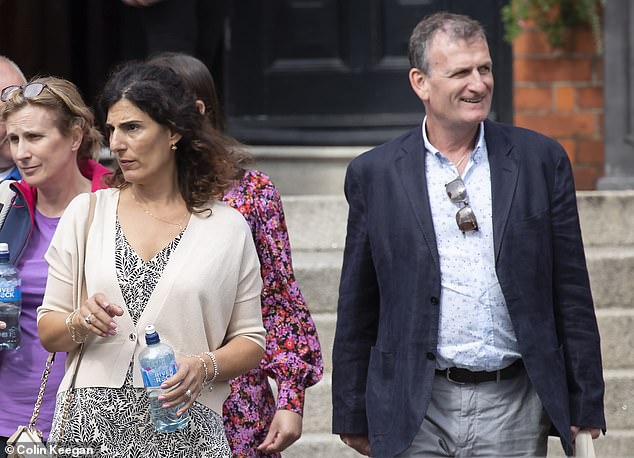Teenager, 18, jumped off a bridge to her death three months after being drugged and raped while on holiday in Greece, inquest hears
A teenager died by suicide three months after being drugged and raped while on holiday in Greece, a judicial inquiry has found.
Julie Crowe, 18, of Porterstown Lane, Dunshaughlin, Co. Meath, Ireland died as a result of injuries sustained after she jumped off a bridge over the M3 motorway near Rathbeggan Lakes on 4 November 2019.
A Dublin District Coroner’s Court hearing on Thursday heard the tragic circumstances of how Julie had developed a low mood and thoughts of self-harm after being drugged and raped while on holiday abroad with friends in August 2019.
It was also communicated at the inquest that Gardaí had not received any further feedback on the progress of any criminal investigations in Greece, despite several requests after providing a statement from Julie to their Greek counterparts through Interpol.
Julie’s father, Gary Crowe, told the inquest that he decided to work from home on the morning of November 4, 2019 because his daughter hadn’t slept.
Teenager Julie Crowe (pictured), 18, died by suicide three months after being drugged and raped while on holiday in Greece, a judicial inquiry has found

Julie Crowe (pictured), 18, of Porterstown Lane, Dunshaughlin, Co. Meath, Ireland died as a result of injuries sustained after jumping off a bridge over the M3 motorway at Rathbeggan Lakes on 4 November 2019
Mr Crowe recalled that she was dizzy and seemed ‘very subdued and very detached’ when he woke her up at around 12.20am.
He said she apologized for the expense of traveling to the US from which they had recently returned.
Mr Crowe said he hugged his daughter in an attempt to “bring her out of her daze”.
When Julie took a shower, Mr. Crowe said he saw a note on her bed that he thought was part of a diary.
When he went to check on her at around 2.15pm, Mr Crowe said he couldn’t find his daughter anywhere in the house before calling his wife to express his concern that Julie had run away.
It was then that he remembered the note and discovered that it contained a reference to Rathbeggan Lakes when he read it.
When he got to the viaduct bridge, Mr Crowe said he saw traffic stop on the motorway before seeing his daughter lying on the ground.
Attempts by her father and passers-by to resuscitate her were unsuccessful.
A passing motorist, Jonathan Madden, told the inquest how he had called 999 after driving past the M3 and saw a girl standing outside the railing of the viaduct bridge.
Mr Madden said he left the motorway at the next junction to return to the bridge, but the girl was face down on the ground by the time he got to the scene.
The inquest revealed that it was a very wet day with poor visibility.
Garda Jeffrey Moroney said CCTV footage from the bridge had confirmed eyewitness evidence and that the investigation into the matter was closed.
Julie’s mother, Anna Crowe, gave evidence of formally identifying her daughter’s body to Gardaí at Connolly Hospital Blanchardstown (CHB).
Ms Crowe said she was called by her husband Gary at around 2.20pm to say Julie was at the M3 bridge.
When she arrived at the scene, Ms Crowe said she found her daughter on the highway and was unable to detect a heartbeat.
Ms Crowe said she and her husband waited in a patrol car while paramedics attended to her before being taken to hospital.
The inquest revealed that at 3:50 p.m., the family was informed by medical staff that Julie had suffered catastrophic injuries from which she would not survive, and was pronounced dead nine minutes later.
Post-mortem results confirmed that Julie suffered a head injury as a result of a fall from a height.
In January 2020, Ms Crowe spoke of her daughter’s death on RTÉ’s Liveline program as a warning to others that there were predators targeting young boys and girls.
She outlined how Julie realized through conversations with friends that she had been raped during their stay on the Greek island of Zakynthos.
Omer Chaudhary, a psychiatrist who examined Julie at CHB’s emergency department on Oct. 21, 2019, said he determined she suffered from post-traumatic stress disorder and a moderate major depressive episode.
Dr. Chaudhary said Julie had also come out as gay to her friends and family in June 2019 after returning from her holiday in Greece.
He remembered the teen complaining that he couldn’t handle things for the past two weeks and that he was having more and more nightmares.
Dr. However, Chaudhary said she had not shown any active intention or plan to commit suicide.
The psychiatrist said she was positive about her family and her studies at Dublin University of Technology.
He said Julie also recognized her symptoms and triggers and needed professional help to get better, but believed she had a bright future.
The inquest revealed that Julie refused to be hospitalized voluntarily and that she did not meet the criteria for involuntary detention, as there was only a low to moderate risk of self-harm.

Anna (second left) and Gary Crowe, parents of the late Julie Crowe, photographed leaving Dublin District Coroner’s Court this afternoon after giving evidence at the inquest into the death of an 18-year-old
Dr. Chaudhary said the teen eventually decided to see her GP to discuss taking antidepressants and to be referred to her local child and adolescent mental health unit.
Ms Crowe said Julie went to see her GP the next day, who warned her to be closely monitored while on medication.
She also revealed that her daughter feared she could be pregnant as a result of the rape, but tests showed that was not the case.
Garda Detective Michelle O’Brien told the inquest that she had spent two “long and difficult” days taking a very detailed statement from the teenager about what had happened in Greece.
Det Garda O’Brien said she also kept the girl’s towel and tokens as evidence.
Responding to questions from the coroner, Aisling Gannon, she said she had not received any updates on the status of the investigation by the Greek police, despite sending several requests.
Det Garda O’Brien said she was unable to communicate directly with her Greek colleagues.
She also stated that she could not interview Julie’s friends, who might also be able to provide evidence, unless instructed by the Greek authorities.
At the end of the evidence, the Crowe family called for more clarity on Gardaí’s ability to assist and monitor the progress of police investigations abroad.
They also recommended that organizations working with victims of sexual violence should engage with parents who are standing up for their raped children, regardless of age.
Ms Crowe explained that the Dublin Rape Crisis Center was reluctant to talk to her about a more urgent appointment for her daughter because Julie was over 18 and had to contact them herself.
The coroner said she would discuss the family’s concerns with the relevant authorities and keep them informed of any comments.
Ms. Gannon has issued a verdict of death by suicide based on the evidence.
The coroner offered her condolences to the Crowe family, saying it was “a very, very tragic case in very sad circumstances.”
For confidential support, call the Samaritans in the UK on 08457 90 90 90, or visit a local Samaritans branch.
